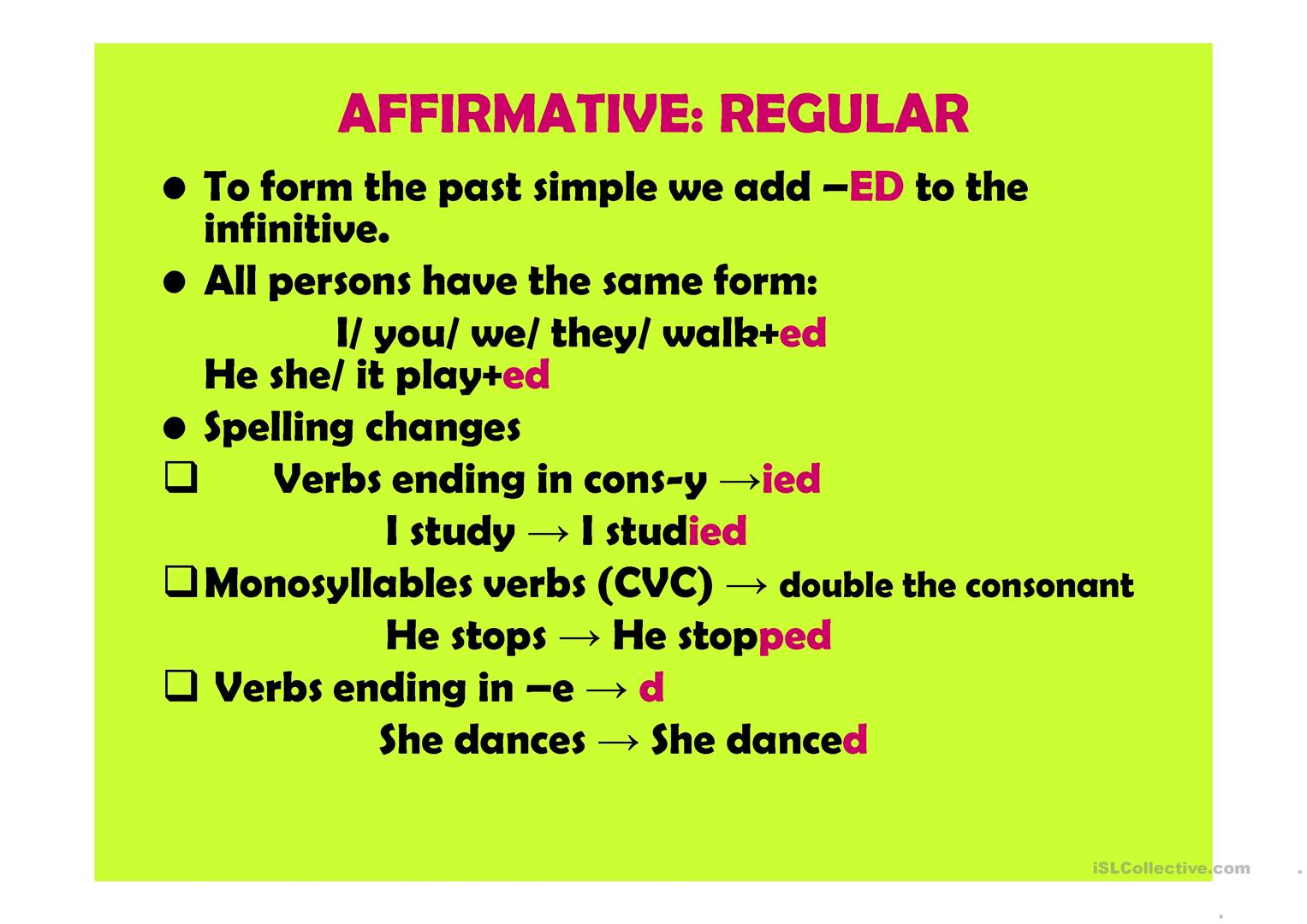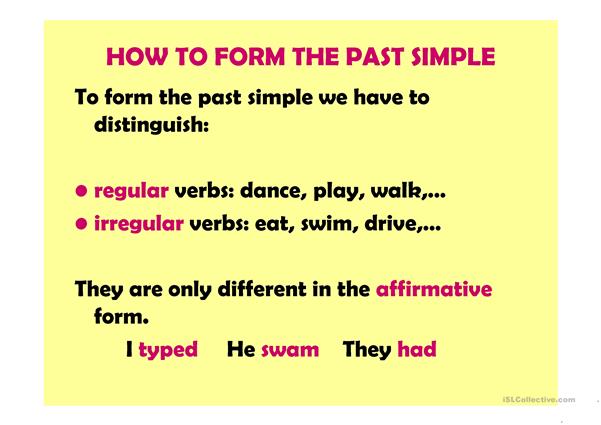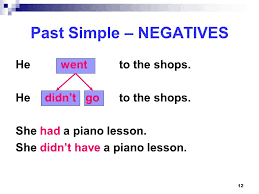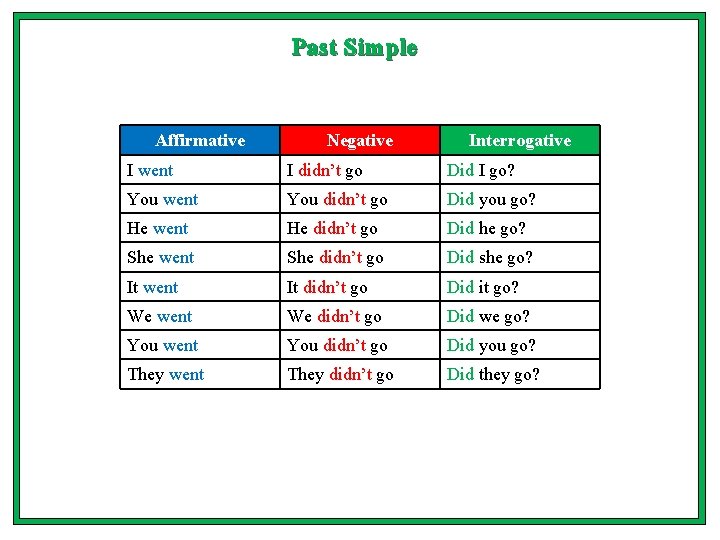Module 1
Grammar
Simple past tense
*We use the past simple tense to talk about something that has already happened .
When expressed in its affirmative form, the verb confirms something about the subject.
Form:
Sub + v2 + C.
v2= regular verb (verb +ed) liked, walked , played....etc. OR irregular (without ed) Like: went, wrote, spoke......etc.
Examples :
1. We played football yesterday .
2. They voted to petra in 2007.
3. My brother went to Mecca last year.
*Here we can mention the keywords of the simple past tense.
| yesterday / ago / last (year / ago .....etc)/ in the morning / 2002 ......etc |

***********************************************
Bay attention:
The simple past (to be) :
was : he , she , it,I ( for singular).
were : They, we , you (for plural).
1.I was ill last night.
2. My cousins were doctors in 1992.
**************************************************

*****************************************************

**************************************
Remember:

***********************************************
Nigative form:
To make negative negative sentences in the simple past we use the auxiliary 'did not' / 'didn't' and the base form of the verb.
Sub + did + not + v1 +C.
Examples:
1.I didn’t play football yesterday.
2.They didn’t go to the theater last month.
3.She didn’t arrive on time this morning.

**************************************************
Interrogative form:
The past simple of both regular and irregular* verbs in its interrogative form has this structure:
Did + subject + verb + …?
*Did is the past form of the verb do.
1.Did you plant some flowers?
2.Did she finish her task?
3.Did you sing in the church choir?
4.Did they play football at school?
5.Did he go to school last year?
6. Did they throw a party yesterday?

SB page 9 / exercise 1:
1 Each of the sentences below contains a mistake in the Past Simple form. Correct the mistakes and explain what is wrong.
1. Why did she does it?
2. When do Um Issam begin to collect traditional objects and clothes?
3. How do she learn to make traditional handicrafts?
4. What did she taught poor women?
5. How did she helped disabled people?
The answer:
1. Why did she do it?
2. When did Um Issam begin to collect traditional objects and clothes?
3. How did she learn to make traditional handicrafts?
4. What did she teach poor women?
5. How did she help disabled people?
***************************************************
SB page 9 / exercise 2
2 Now, answer the questions with full sentences.
1. Um Issam did it because she wanted to save Arabian traditions.
2. Um Issam began to collect traditional objects and clothes 45 years ago.
3. Um Issam learnt to make traditional handicrafts from her mother and grandmother.
4. Um Issam taught poor women traditional crafts.
5. Um Issam helped disabled people by teaching them to make simple but attractive handmade materials.
*****************************************************************
SB page 9 / exercise 4
4 Now, listen to the dialogue and check your answers. In a group, discuss your guesses.
|
Muneer: Hello, Omar! It’s Muneer. How’s everything? Omar: Muneer! Where have you been? I (1) _____ (try) to call you several times, but you weren’t at home. Muneer: I (2) _____ (be) on holiday in Jordan. Actually, I’m calling to check if I can see you today. I have a gift for you. Omar: A gift! It’s not my birthday yet! Muneer: I (3) _____ (find) very interesting things in Petra and Madaba and got you something you’ll really like. I (4) _____ (watch) people in the streets making beautiful handicrafts. There (5) _____ (be) bags and rugs made of sheep’s wool and goats’ hair, colourful carpets and sand art in bottles. I (6) _____ (buy) a silver necklace for my mum. It’s all handmade! Omar: That’s amazing! So, what did you get for me? Muneer: You have to guess! |
Muneer: Hello, Omar! It’s Muneer. How’s everything?
Omar: Muneer! Where have you been? I tried to call you several times, but you weren’t at home.
Muneer: I was on holiday in Jordan. Actually, I’m calling to check if I can see you today. I have a gift for you.
Omar: A gift! It’s not my birthday yet!
Muneer: I found very interesting things in Petra and Madaba and got you something you’ll really like. I watched people in the streets making beautiful handicrafts. There were bags and rugs made of sheep’s wool and goats’ hair, colourful carpets and sand art in bottles. I bought a silver necklace for my mum. It’s all handmade!
The answer: 1. tried; 2. was; 3. found; 4. watched; 5. were; 6. bought
Omar: That’s amazing! So, what did you get for me?
Muneer: You have to guess!